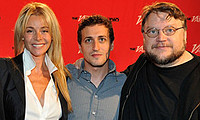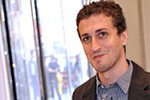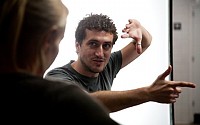 Facing very real fears
Facing very real fearsGuillem Morales and Belén Rueda look through Julia's Eyes...

At the Toronto premiere: Guillem Morales and Belen Rueda (above),
and with Guillermo del Toro (below)

BELEN RUEDA
16.Mar.65 • Madrid




GUILLEM MORALES
1975 • Barcelona



 Spain seems unusually packed with gifted horror filmmakers. Alejandro Amenabar (The Others), Guillermo del Toro (Pan's Labyrinth), Juan Carlos Fresnadillo (Intacto), Juan Antonio Bayona (The Orphanage), and Jaume Balagueró and Paco Plaza (Rec) have made some of the most original, genuinely unsettling films in recent years, using internal drama to make movies that are far scarier than slasher movies or torture porn. Now del Toro has found another skilled filmmaker, Guillem Morales, whose obvious love for Alfred Hitchcock's expert sense of terror infuses the new thriller Julia's Eyes, starring The Orphanage's Belén Rueda.
Spain seems unusually packed with gifted horror filmmakers. Alejandro Amenabar (The Others), Guillermo del Toro (Pan's Labyrinth), Juan Carlos Fresnadillo (Intacto), Juan Antonio Bayona (The Orphanage), and Jaume Balagueró and Paco Plaza (Rec) have made some of the most original, genuinely unsettling films in recent years, using internal drama to make movies that are far scarier than slasher movies or torture porn. Now del Toro has found another skilled filmmaker, Guillem Morales, whose obvious love for Alfred Hitchcock's expert sense of terror infuses the new thriller Julia's Eyes, starring The Orphanage's Belén Rueda.
Is it true that this project started with a single image?
Guillem Morales: I think everything starts with an image, in this case it was a blind woman wearing a bandage around her eyes. The only thing I knew about her was that she had been operated on and been told not to remove the bandage for two weeks, otherwise the results of the operation would be ruined. It was the only information I had. From that point on, you have to create a plot, a character, and ask questions about what the image suggests to you.
Belén, what was your reaction when you first read the screenplay?
Belén Rueda: Sometimes when you read a script for the first time it's very easy to understand, but this one was very difficult because for around 30 minutes you don't see any of the characters' faces. There is only one line in the script that explains this, so you if you miss it you don't understand anything — and it happened to me! So I had to go back. And I loved it because it's not just one thing that happens, it's every emotion. Guillem was able to make the audience empathise with her character, and that is very difficult. At first the producers told him, it's impossible to make a film where the main character doesn't see the other characters faces for a long time. I almost told him the same thing. And in this film we have one character who almost is the camera; the beautiful thing is that you don't notice it, but you feel it at the end of the film.

This script was difficult because for around 30 minutes you don’t see any of the characters’ faces.
Belén: I think in The Orphanage, playing a mother, from the first moment you see her you can see she's a very strong woman and she's going to do everything to find her son. In Julia's Eyes, at first you can think this is a woman who's very weak or needs someone in her life. But at the end you can see, even she can see, that she's very strong. At the end they are both fighters, but in The Orphanage you can see that straight away.
Julia's Eyes has been compared to The Orphanage, even though they're very different films — different genres even.
Guillem: My film is a raw realistic thriller that talks to you about real fears, whereas the other film was a paranormal ghost story. But the most important thing is the audience can enjoy another great performance from Belén. Julia's Eyes is about a woman going blind who needs to accept that. Despite being a thriller, we took that seriously and talked a lot about losing sight with blind people. There are all the fears that you would feel if you were losing your sight. Am I dependent on someone else the rest of my life? Will the person I love leave me? Would the operation work?
How was it to work with Guillermo del Toro as a producer?
Guillem: He's one of the most generous people I've ever met in the film world. If you have a problem, you know that he's always there for you. He wants to make sure that you have everything you need to make the best film possible. It's like having an angel protecting you if you have a problem. He's not only a producer, he's a director as well so he understands perfectly what a director needs on the set. We didn't agree on some things but he respected my thoughts.
Belén: You feel free, which is not always the case with producers.
How did you go about creating the sense of someone losing their sight?
Guillem: I suppose camerawork is pretty important. There was something in the script I was very obsessed with: the idea of the audience sharing the feeling of Julia's blindness. For approximately 30 minutes, you can't see the faces of the characters around Julia, and this decision was made in the script. It was a big challenge because nobody understood it, even the producers. Even Guillermo del Toro, I don't know if he understood the idea to start with. But it was interesting because you can feel that something is not right at that moment. You feel the frustration about not seeing. Blindness for the audience was about avoiding the faces. The most important thing in films are the eyes of the actor, and she's wearing a bandage.

The most important thing in films are the eyes of the actor, and she’s wearing a bandage.
It looks like it was a very physically and emotionally demanding role.
Belén: Physically no, although with the blind contact lenses, I couldn't see — only if it's black or white but nothing more. It was much harder emotionally. I love characters that emotionally change in the story you're telling. But it's a little difficult, because you put a little of you in the character. It's also important that each one is different, and you have to understand the character's motivation. I like to find the things that are similar to me, so I speak to people in those same situations, because it's important that the audience watching the film feels they are one of the characters they're watching. They have to be real; even if you're making a comedy that's really absurd, you have to believe them.
Guillem: It doesn't matter if it's a comedy or horror or sci-fi, our work is always looking for the truth. The truth is always there and you have to find it.
Belén: In this film, [Julia's sister] Sara is a very short performance, but one day at the end of the performance I almost fainted, because she's very strong. She had finished with me!
Spanish actors like Penelope Cruz and Javier Bardem have found success in Hollywood. Is that something that appeals to you?
Belén: I think that it's not important if you come from England, Australia, Spain or France, the important thing is the project, even if it means having to live outside your country for six months. For example with Penelope Cruz or Antonio Banderas, who had to live there because of the work. And it's great because they opened the door to all of us Spanish actors. I have two daughters who are now older than 5. Maybe five years ago I could say no, but today it depends if Spielberg calls!
Which films scare you?
Guillem: Hmm, I would say The Shining.
Belén: All of them! Before I made The Orphanage, many films that are very important, like The Shining for instance, I couldn't finish! And in that moment, I said to myself, "OK, OK, I can, I can." But I get scared very easily. Of course, if I'm there in the film, it's different.
If you had to live without one of the senses, which would it be?
Guillem: Not sight, I would lose my job!
Belén: Speech. You know at first maybe you think taste, but I know one person who cannot taste, and she says that it's horrible.
Guillem: Going deaf. If I would have to choose, I suppose hearing.
Belén: And music?
Guillem: Oh, music, isolation. Of course. What a horrible question!
THANKS TO TO HOLLY AT THINKJAM • May.11
HOME | REVIEWS | AWARDS | NEWS | FESTIVAL | Q&A | ABOUT | TALKBACK

